The digital divide as a complex and dynamic phenomenon 數位落差現象11月 30, 2011期刊論文閱讀0 CommentsEditCopyDow
资讯 2024-07-10 阅读:203 评论:0Van Dijk, J., & Hacker, K. (2003). The digital divide as a complex and dynamic phenomenon. The information society, 19(4), 315–326.
In this paper we will try to develop scientific conceptual distinctions and to present reliable and valid empirical data of longitudinal research on this subject matter.
1. The multifaceted concept of access
- psychological access 心理層面的取用: Lack of any digital experience caused by lack of interest, computer fear and unattractiveness of the new technology ('psychological access');
- material access 物質層面的取用: No possession of computers and network connections;
- skills access 技巧層面的取用: Lack of digital skills caused by insufficient user-friendliness and inadequate education or social support;
- usage access 用法層面的取用: Lack of significant usage opportunities.
He expects the appearance of a usage gap between parts of the population systematically using and benefiting from (1) advanced digital technology and the more difficult applications and services, and (2) other parts only using basic digital technologies for simple applications with a relatively large part of entertainment.
2. Some facts: a digital divide in the USA and Europe?
We will base our conclusions on these data:
- the US Censusbureau data 1984, 1989, 1993, 1997,
- the partly overlapping NTIA data about telephone and computer penetration 1994 and 1997,
- the annual Eurobarometer (European Union) and
- Dutch official statistics (by the SCP) of 1985, 1990, 1995 and 1998.
2-1 Elementary digital experience 基本數位技巧
Presumably, there is some 'gap of motivation' among the populations of (even) high-tech countries. People with (1) old age, (2) low education, a large proportion of women and (functional) illiterates are strongly over-represented at the one side of it.
2-2. Possession of computers and network connections
2-3. Digital skills
- Digital skills are not primarily related to educational levels but to age and gender.
Probably, this means that real practice and motivation are more important in acquiring digital skills than formal education. - Indeed, many studies reveal that having computer experience at work, having particular hobbies and having a family with schoolchildren are decisive factors in the acquisition of digital skills by adult people.
2-4. Different uses
- With age fairly large differences appear in using games, spreadsheets / databases / bookkeeping (USA)
- With gender we see that females use all applications significantly less than males.
- In the USA only the data of income levels are availablerevealing differences in e-mail and Internet use and other more advanced applications: bookkeeping, spreadsheets, databases and work at home.
Interpretations
Social and political opinion has developed four kinds of positions with interpretations of the state of affairs:
- Denial of the existence of a digital divide;
- Acceptance of some present divide(s), claiming that they will soon disappear;
- Emphasis of digital divides which are supposed to grow and come on top of old inequalities of income, education, age, gender, race and geographical location;
- Differentiation: some divides are decreasing while others grow.
4. Scientific explanations
- Material Resources: about the possession of all kinds of equipment
- Social Resources: 1) having a social network also possessing and using digital technology and 2) having social support in managing it.
- Cognitive Resources: literacy (搜尋文字), numeracy (處理計算問題) and informacy (數位技巧)
結果:
Results #65306
- Possession of ICTs is explained more by informacy (digital skills) than by material resources.
- Skills are explained by literacy and social resources (having a social network and support).
- A remarkable result is literacy being far more important for the explanation of digital skills than numeracy.
5. Conclusions and Policy Perspectives
There is no question of an absolute, yawning and unbridgeable gap between two classes of people.
- The fundamental task of future society will be to prevent structural inequalities in the skill and usage of ICTs becoming more intense.
- There are in fact several divides: Time series ofofficial statistics have demonstrated that during the 1980s and 1990s gaps of income, employment, education, age and race in the possession of computers and hardware have not persisted but grown.
- Together they may create a usage gap that is somewhat familiar to the knowledge gap described by Tichenor et al. a long time ago.
"As the diffusion of mass media information into a social system increases, segments of the population with a higher socio-economic status tend to acquire this information at a faster rate than the lower status segments"
The policy perspectives:
- Central objectives:
- The first objective is backed by a big coalition of forces in advanced high tech societies.
- The second objective is more traditional and it is supported more in Europe than in the US, for instance.
Four kinds of access distinguished:
- Elementary digital experience is first of all a question of the market developing and offering ICTs that really are user-friendly and that offer such a clear surplus value as compared to old applications that the 'information want-nots' will be convinced.
- Possession of computers and networks: Household income is still the most important factor here. So, tax and income policies of governments certainly do make sense.
- Learning digital skills will be a strategic objective for educational institutions at all levels.
- Improving usage opportunities for all means making them more attractive to some people in the first place.
因為覺得之前note寫太多中文了,有點奇怪,所以最近這幾篇都大量引用原文。但有時候反而覺得這樣也不是很好閱讀orz 總之這篇就是在講各種數位落差的情況還有一些建議啦!
It’s strange to think that note has written too much in Chinese #65292; it’s a little strange #65292; so these recent articles have been heavily quoted #1229; but sometimes it’s not very good to read orz, and it’s just that there’s some advice about all kinds of digital differences #65281.
注册有任何问题请添加 微信:MVIP619 拉你进入群

打开微信扫一扫
添加客服
进入交流群








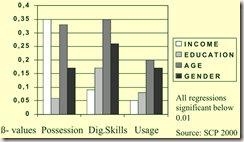
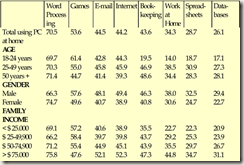
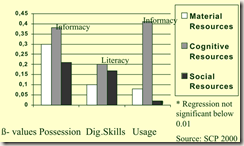










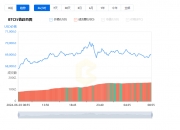
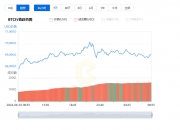
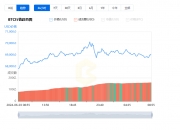


发表评论